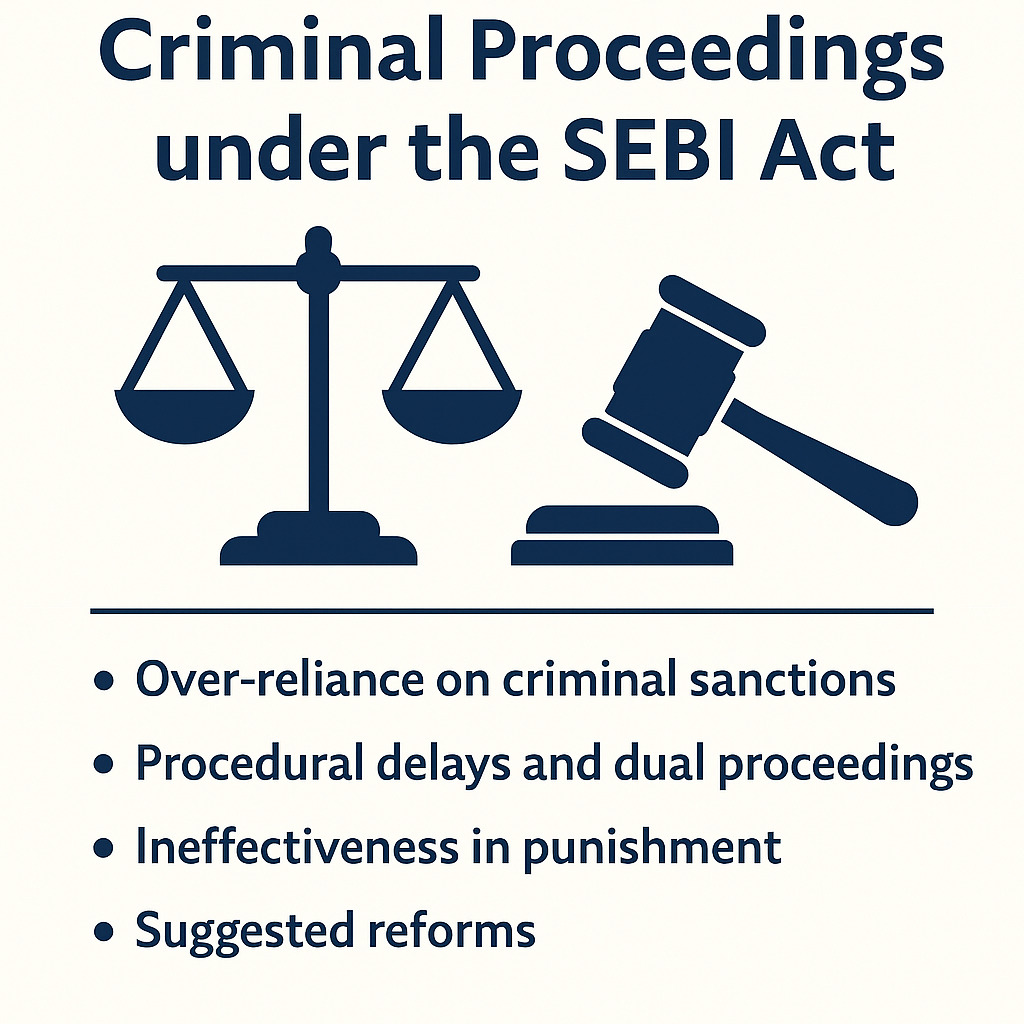View News
Strengthening-Securities-Law-Enforcement-Reforming-SEBI-Criminal-Framework

Strengthening Securities Law Enforcement: Reforming SEBI’s Criminal Framework
1. Introduction
The Securities and Exchange Board of India Act, 1992 (SEBI Act) was enacted to regulate the securities market, protect investors, and develop the capital market. Over the years, SEBI has gained quasi-legislative, executive, and quasi-judicial powers to maintain market discipline. However, criminal proceedings under the SEBI Act have raised concerns due to delays, over-criminalization, lack of specialization in trials, and limited deterrence.
Recent judicial pronouncements and government initiatives indicate a pressing need for reforms to make SEBI’s enforcement mechanism more effective, proportionate, and just.
2. Current Framework of Criminal Proceedings under the SEBI Act
2.1 Relevant Provisions
-
Section 24 – Provides for criminal liability, including imprisonment up to 10 years or fine up to ?25 crores, or both, for contraventions.
-
Section 26 – Deals with cognizance of offences. Courts take cognizance only on SEBI’s complaint and prosecution happens in Magistrate’s Courts.
-
Section 11C(6) – Deals with prosecution for failure to co-operate during investigation.
2.2 Nature of Offences
-
Non-compliance with SEBI directions
-
Insider trading
-
Fraudulent and unfair trade practices
-
Mis-statements in public offer documents
3. Challenges in the Existing Criminal Framework
3.1 Over-reliance on Criminal Sanctions
-
SEBI resorts to criminal prosecution even where monetary penalties would suffice.
-
Criminal sanctions are often disproportionate for procedural violations.
3.2 Procedural Delays
-
Prosecutions drag for years due to overloaded criminal courts lacking domain expertise.
-
As a result, criminal trials lose deterrence value.
3.3 Dual Proceedings
-
Simultaneous civil penalties (adjudication under SEBI Act) and criminal prosecution create duplication and hardships for accused.
3.4 Ineffectiveness in Punishment
-
Very few cases result in actual conviction.
-
Most cases end in compounding or settlement, diluting criminal liability.
4. Recent Judicial Trends
4.1 SEBI v. Gaurav Varshney (2016) 14 SCC 430
-
The Supreme Court emphasized that compounding of offences under Section 24A should be encouraged to reduce pendency.
-
Highlighted that minor violations should preferably be settled through civil or monetary penalties rather than criminal punishment.
4.2 P. K. Pradhan v. State of Sikkim (2001) 6 SCC 704
-
Though not SEBI-specific, reaffirmed that mens rea (criminal intent) is essential unless expressly excluded by statute.
-
Implies that technical breaches of SEBI regulations without fraudulent intent may not deserve criminal treatment.
4.3 SEBI v. Roofit Industries Ltd. (2016) 12 SCC 125
-
Clarified that in certain cases, mens rea is not a prerequisite for imposing penalties under SEBI Act.
-
However, the judgment stressed the importance of proportionality while imposing sanctions.
5. Global Best Practices
-
United States (SEC): Greater reliance on civil penalties and administrative proceedings; criminal prosecution reserved for egregious frauds.
-
United Kingdom (FCA): Employs a "ladder of intervention"—informal warnings, financial penalties, and criminal sanctions only in serious cases.
-
Australia (ASIC): Use of enforceable undertakings, infringement notices, and civil penalty proceedings before moving to criminal prosecution.
6. Suggested Reforms
6.1 Decriminalization of Minor Offences
-
Convert minor regulatory violations (e.g., late filing, procedural lapses) into civil wrongs subject to monetary penalties rather than criminal prosecution.
6.2 Specialized Securities Courts
-
Establish Special Securities Benches within courts or independent Securities Tribunals with criminal jurisdiction for speedy and expert adjudication.
6.3 Rationalizing Dual Proceedings
-
Introduce clear guidelines on when SEBI can initiate criminal prosecution, limiting it to cases involving fraud, misappropriation, or serious market abuse.
6.4 Time-bound Proceedings
-
Mandate time-bound trial procedures (say, within 1-2 years) for SEBI-initiated criminal cases.
6.5 Greater Emphasis on Compounding and Settlement
-
Expand the scope of compounding at an early stage under Section 24A.
-
Incentivize settlement and remediation for early closure of non-serious cases.
6.6 Training Judicial Officers
-
Sensitize and train judicial officers handling SEBI matters on securities law principles, financial products, and market structures.
7. Ongoing Legislative Initiatives
-
Jan Vishwas (Amendment of Provisions) Bill, 2023:
-
Proposes decriminalization of minor offences under various laws including SEBI Act.
-
Seeks to replace criminal liability with monetary penalties for procedural contraventions.
-
8. Conclusion
Reforming criminal proceedings under the SEBI Act is crucial to strengthen regulatory effectiveness, enhance investor confidence, and ensure that punishment is proportionate, timely, and meaningful.
By learning from global practices and embracing a balanced approach between civil and criminal enforcement, SEBI can better fulfil its mandate to maintain the integrity of India’s securities markets.
Important Case Law Summary
| Case Name | Key Takeaway |
|---|---|
| SEBI v. Gaurav Varshney (2016) | Encouraged compounding of offences to reduce pendency |
| P. K. Pradhan v. State of Sikkim (2001) | Reiterated requirement of mens rea for criminal offences unless specifically excluded |
| SEBI v. Roofit Industries Ltd. (2016) | Clarified that mens rea not required for penalty but proportionality must be observed |
"Unlock the Potential of Legal Expertise with LegalMantra.net - Your Trusted Legal Consultancy Partner”
Disclaimer: Every effort has been made to avoid errors or omissions in this material in spite of this, errors may creep in. Any mistake, error or discrepancy noted may be brought to our notice which shall be taken care of in the next edition In no event the author shall be liable for any direct indirect, special or incidental damage resulting from or arising out of or in connection with the use of this information Many sources have been considered including Newspapers, Journals, Bare Acts, Case Materials , Charted Secretary, Research Papers etc.

